Polyester-recycling – European-nonwovens 01-04-2022 - Arhive
Polyester-recycling – European-nonwovens
-BB Engineering GmbH records order intake from Thai Polyester for four VacuFil recycling systems
BB Engineering GmbH, Remscheid, Germany, a subsidiary of Oerlikon Textile, announced that Thai Polyester Co., Ltd, Thailand, has placed an order for four VacuFil systems for recycling bottle flakes with connected direct spinning. The polyester manufacturer, established in 2001 and with an overall annual capacity of 316,800 tons, is one of Thailand’s leading producers.
To this end, the company already operates Oerlikon Barmag and Oerlikon Neumag systems. The BB Engineering VacuFil systems will be deployed to convert existing spinning plant equipment from processing polyester to processing PET bottle flakes without loss of performance. Polyester-recycling – European-nonwovens
BB Engineering supplies the complete recycling process – from the drying stage and extrusion, all the way through to the spinning plant-appropriate fine filtration stage. Thanks to decades of experience in spinning plant technology, the German machine constructor claims to provide comprehensive spinning plant know-how and is aware of how the recycling process must be designed to ensure that the product manufactured using the spinning plant has the right quality. The four new VacuFil systems will be integrated into the existing building infrastructure and process landscape at Thai Polyester, with a total output of approx. 4,000 kg/h.
The VacuFil systems will be complemented by BB Engineering 3DD mixers for directly feeding dyes into the recycled melt flow. Commissioning has been scheduled for 2023. Polyester-recycling – European-nonwovens
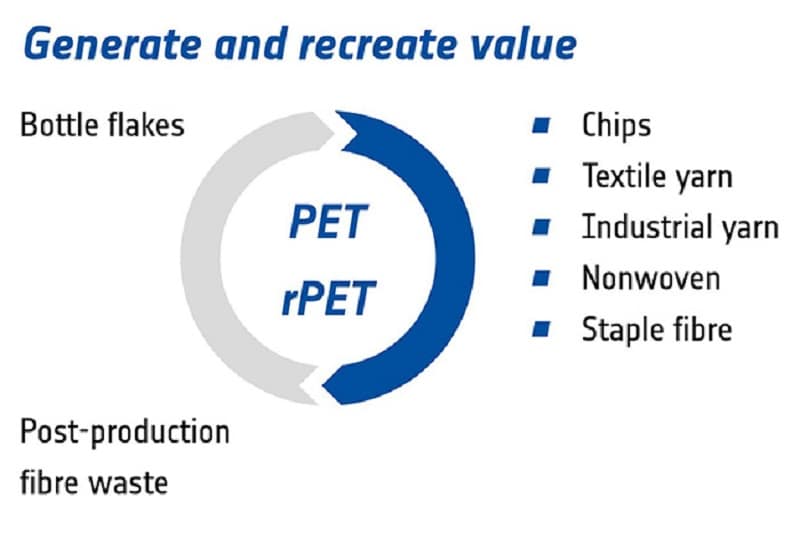
-Treatment of odour-contaminated post-consumer plastics
A large amount of plastic waste from consumer-market packaging is generated daily. In order to obtain high-quality plastic recyclates from these material streams, and to be able to make them reusable for high-quality applications, odorous substances that have migrated into the material during the course of the product-life must be removed. Up till now, these odourous substances could be removed only inadequately through recycling processes. Kreyenborg intends to change the scenario with the introduction of the new modular systR-Fresh. Polyes ter-recycling – European-nonwovens
In the first process step, an infrared module installed above the material bed heats the material quickly and directly to the optimum temperature level for the plastic in question. In this process, the continuous rotation of the drum ensures a homogeneous mass flow with a defined dwell time (applying the first-in/first-out principle). Due to the rotation and mixing elements integrated in the spirals, the material is continuously mixed in the drum with constant surface exchange. Combined with controlled heating, this ensures considerable odor elimination, even within a short residence time, states Kreyenborg.
In the second process step, the remaining odourous substances in the regrind or granules are removed by a thermal-physical cleaning process in the IR-Fresh Conditioner. This Conditioner – an insulated hopper – keeps the material to be decontaminated at a temperature range ideal for the decontamination process by means of a hot purge-gas. According to Kreyenborg, excellent results for deodourisation and decontamination can be achieved through the interaction of the main process parameters of air-flow, temperature, and residence time.
Due to its modular design, the IR-Fresh process can be used continuously in two stages both for regrind – before the extrusion process – and for granules after the extrusion process. Polyester-recycling – European-nonwovens

-TOMRA: Packaging makes the leap into the cycle
Binding targets lead to high-quality recycling
To coincide with its 50th anniversary, TOMRA has published a white paper focusing on the effectiveness of extended producer responsibility (EPR). Enshrined in law, this principle has the potential to accelerate the processing of household waste toward a circular economy in which resources are reused multiple times, maximizing their value. Polyester-recycling – European-nonwovens
TOMRA’s new white paper, „EPR Unpacked – A Policy Framework for a Circular Economy”, presents different EPR systems for packaging waste and can serve as a guide for policy makers by bringing together the different perspectives and practical experiences for improving existing systems.
EPR systems ensure that producers, who place packages on the market, take responsibility for the entire lifecycle of their packaging – from design to waste collection and recycling, and final disposal. Since producers must provide funding for this, the waste hierarchy also incentivizes sustainable packaging design and more efficient management.
“Our experience in numerous markets on all continents has shown us which methods can be used to successfully tackle household waste management and which combinations work best,” says Wolfgang Ringel, SVP Public Affairs TOMRA. “The result is clear: the legally defined and thus binding obligations are the right way to direct, active climate protection.”
Meanwhile, the principle of EPRs is being applied not only in Europe, but also in other parts of the world. In Asia, local initiatives have developed into cross-sector networks – a response to the fact that 80% of plastic enters the world’s oceans via Asian waterways. Polyester-recycling – European-nonwovens
South Africa and Vietnam have recently implemented EPRs for packaging, and several states in the United States are currently considering such measures. While these regional efforts are showing results, national and global harmonization remains a challenge, but one that presents great opportunities for the circular economy.
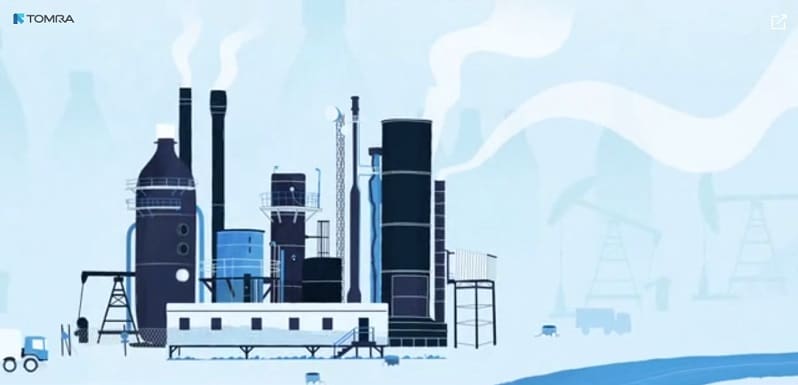
-Graham Packaging Marks Its Progress Toward Recycling Goals
Last year, Graham hit 7% average PCR use, but in four years it aims to achieve 20% PCR in its products overall. Colored PCR and advanced recycling will contribute to that goal. Polyester-recycling – European-nonwovens
In its 2021 Sustainability Report, released in March, Graham Packaging, Lancaster, Pa., documents its progress toward its previously announced recycling goals. Overall, its products averaged 7% post-consumer recycle (PCR) content, including 4% in PET products and 10% in HDPE containers. It is aiming for 20% overall PCR content in its products by 2025. Another goal for 2025 is to produce 100% recyclable products, based on realistic recycling availability in the U.S. For 2021, that “always-recyclable” total was 90.4%, discounting PP, PVC and black plastics, which are not widely recyclable in this country.
Graham Recycling Co. processed 37.8 million lb of PCR in 2021, including 2.5 million lb of ocean-bound plastics, for which the company says it has “identified a continuous, high-quality stream for 2022.” Graham’s North American bottle plants also used 16.1 million lb of post-industrial recycle (PIR) last year.
In addition, the Graham report says the company is continuing R&D on using colored PCR (it currently uses only natural-color PCR), assisted by an unspecified “first-ever innovation” in mechanical PCR recycling. Also two Graham locations—in Evansville, Ind., and Aldaia, Spain—have been certified according to an international sustainability program to utilize PCR from advanced recycling methods. This International Sustainability and Carbon Certificate (ISCC) Plus certification is used to verify traceability management of PCR throughout the supply chain. Graham is convinced of the growing importance of advanced recycling (also called chemical recycling), whereby waste plastics are depolymerized and then repolymerized as “new” polymers, especially for HDPE and PP. Polyester-recycling – European-nonwovens
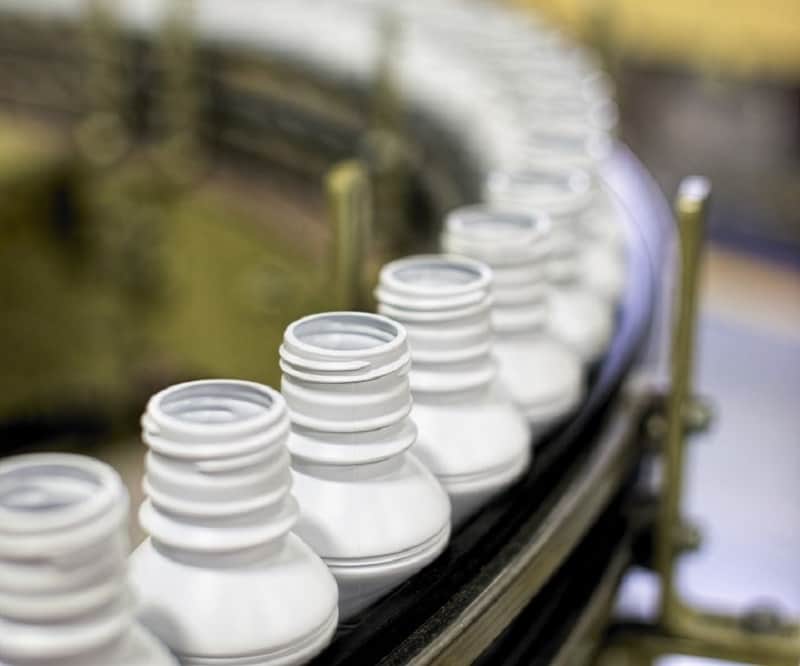
-Construction sector drives European nonwovens growth
Nonwovens production in Greater Europe increased in volume by 2.0% to reach 3,120,967 tonnes (and 87.6 billion square metres) in 2021, driven by 17% growth in the construction sector. Polyester-recycling – European-nonwovens
The latest EDANA Nonwovens Production and Deliveries for 2021 figures also show that since 2019, European output has increased by nearly 9%.
Welcoming the latest growth statistics, Jacques Prigneaux, EDANA’s Market Analysis and Economic Affairs Director, said that following the impressive growth recorded in 2020, the updated figures for Greater Europe (incl. Western and Eastern Europe countries, Turkey, Belarus, Russia and Ukraine) again highlighted the ability of the European industry to innovate and to invest in order to respond the challenges of the pandemic crisis. “This 2% average growth is in line with European forecasts disclosed in October 2021 in our Global Nonwoven Markets 2020-2025 report,” he said, adding that in 2021, significant growth areas for nonwovens were recorded in building construction (+17.4%), agriculture (+11.3%), electronic materials (+10.1%) and air filtration (+9.1%) sectors.
“Countering this,” Prigneaux added, a further decline of -1% was recorded in automotive interior applications. In some market segments, a comparison with the pre-COVID situation is probably more relevant. This is particularly true in hygiene, medical and wipes nonwovens, which were almost flat or slightly decreasing compared to the level reached in 2020, but still much higher than in 2019.”
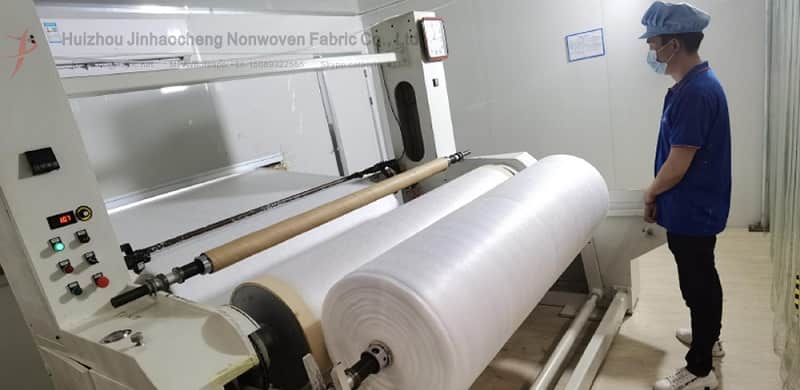
-Ascend agrees to acquire Formulated Polymers Ltd.
Ascend Performance Materials has reached an agreement to acquire the compounding division of Formulated Polymers Limited, a leading engineered materials manufacturer in Chennai, India. This acquisition will establish Ascend’s first manufacturing base in the subcontinent and strengthen Ascend’s global reach in the electrical and e-mobility application space. Polyester-recycling – European-nonwovens
The deal includes a world-scale manufacturing facility in Chennai as well as warehouses throughout India. Formulated Polymers, which has operated over three decades as a polyamide compounder in India, is currently a licensee of Ascend’s Starflam® flame-retardant polyamides.
“Demand for our materials in India is strong and growing,” said Phil McDivitt, Ascend’s president and CEO. “The team at Formulated Polymers has built an excellent, diversified business with a proven track record of technology development in polyamides. We are excited to build on their expertise to drive additional value-added growth in India and beyond.”
Ascend, a fully integrated producer of durable engineered materials, has grown its global production footprint with five acquisitions over the last four years, each focused on specific synergies with the company’s core business. This acquisition provides a significant growth opportunity for Ascend in India, one of the highest growth economies in the world. Polyester-recycling – European-nonwovens
“Being customer-focused is one of our values,” said John Saunders, Ascend’s vice president for Europe, the Middle East, North Africa and India. “We look forward to supporting our customers in a fast-growing market by continuing to invest in capacity, technical resources and product development to meet their needs.”
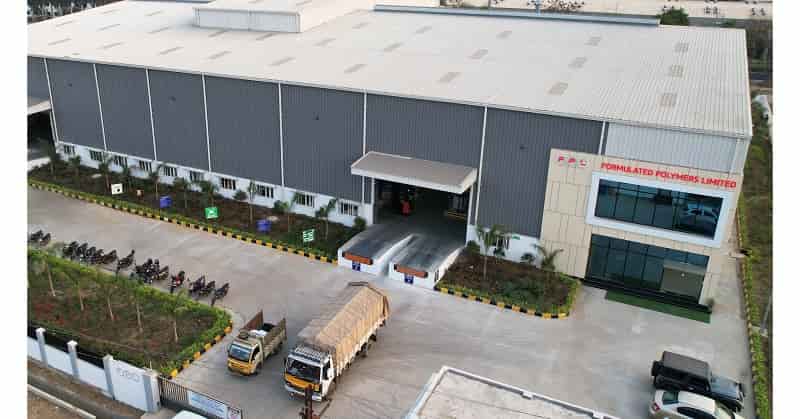
Polyester-recycling – European-nonwovens
